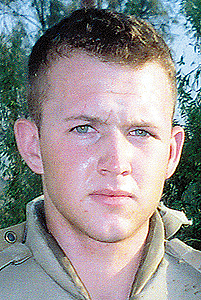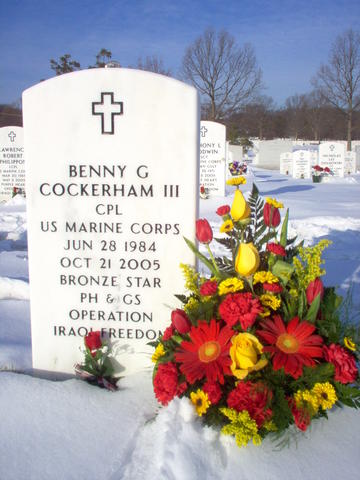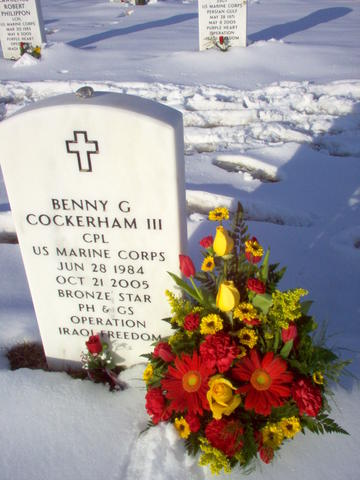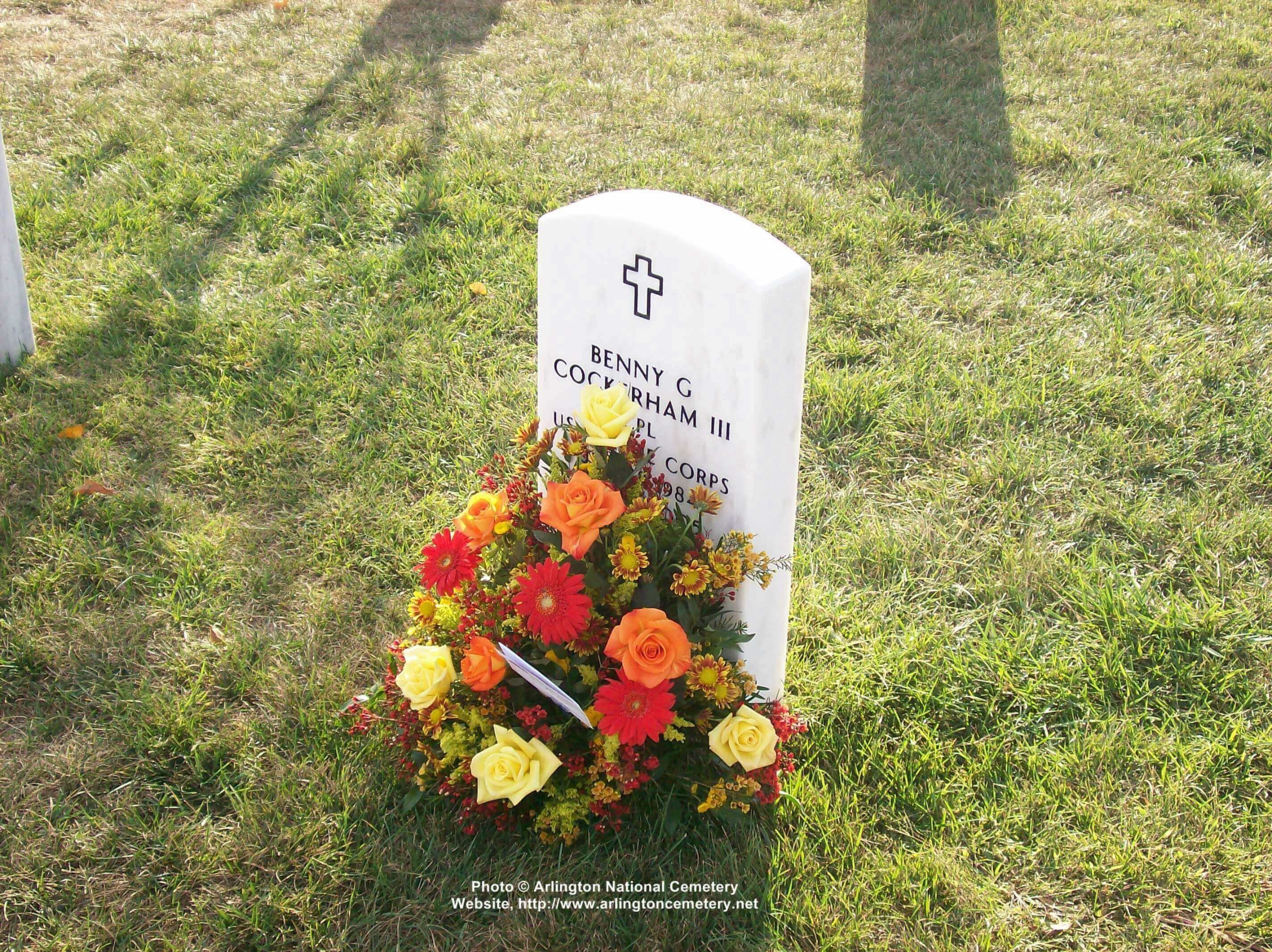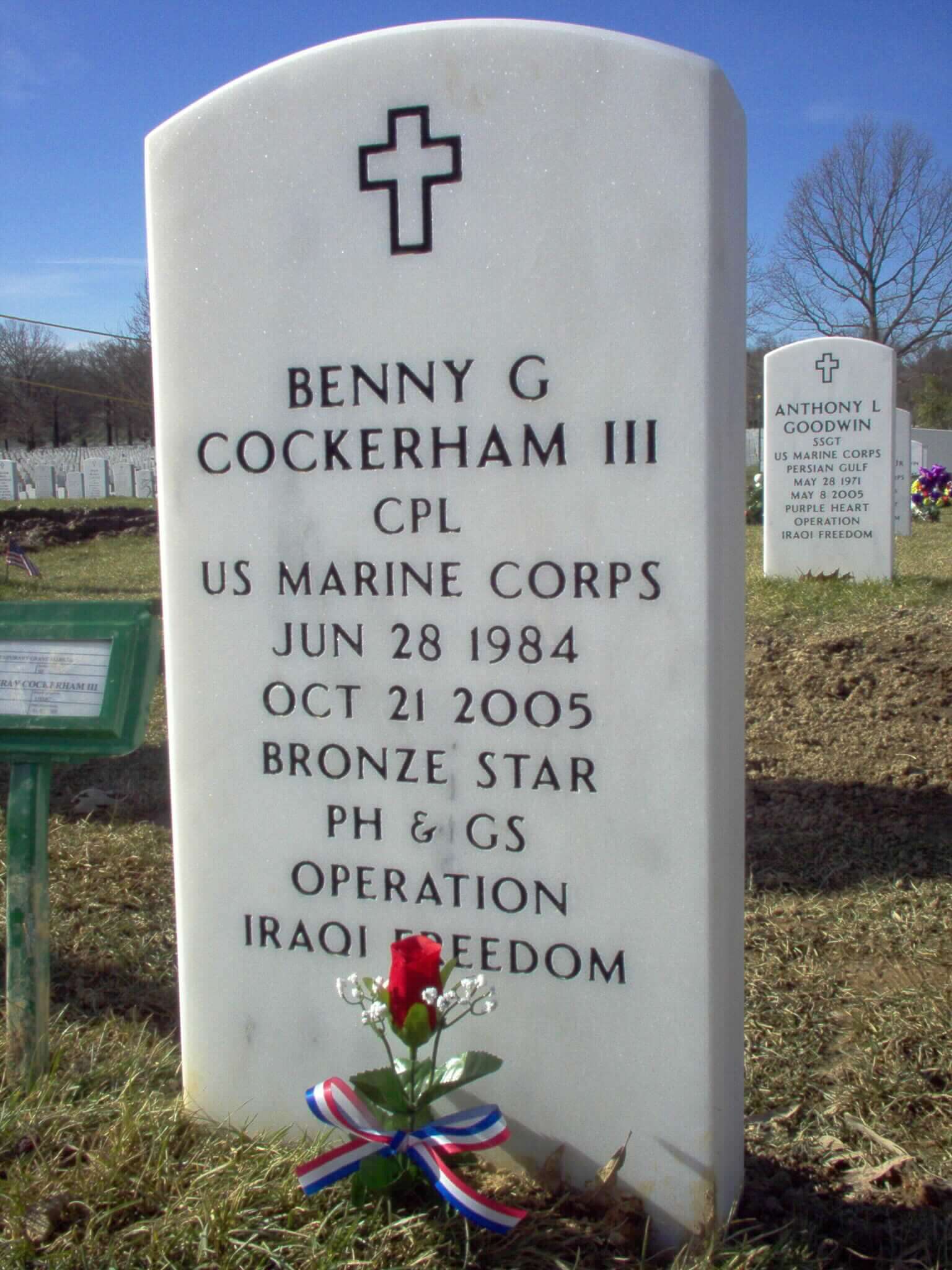NEWS RELEASE from the United States Department of Defense
No. 1096-05
IMMEDIATE RELEASE
October 26, 2005
Media Contact: Marine Corps Public Affairs – (703) 614-4309 Public/Industry Contact: (703)428-0711
DoD Identifies Marine Casualties
The Department of Defense announced today the deaths of two Marines who were supporting Operation Iraqi Freedom.
Corporal Benny G. Cockerham III, 21, of Conover, North Carolina
Captain Tyler B. Swisher, 35, of Cincinnati, Ohio
Both Marines died when their vehicle was struck by an improvised explosive device while conducting combat operations against enemy forces near Al Amariyah, Iraq on October 21, 2005. Their vehicle was traveling beside a canal when the attack occurred and the two Marines were thrown from the vehicle into the water. They were assigned to the 2nd Battalion, 2nd Marine Regiment, 2nd Marine Division, II Marine Expeditionary Force, Camp Lejeune, North Carolina.
CONOVER — Adam Bowman doesn’t have an older brother. He has two younger siblings.
So when he started hanging out with Benny Gray Cockerham III, 21, it was like the older brother he never had.
Bowman, 18, is a senior at St. Stephens High School with Cockerham’s younger brother, Adam. Gray Cockerham was three years older than Bowman. Bowman said Cockerham was friends with a lot of seniors at St. Stephens.
Bowman was shocked Tuesday to learn the cool, older guy he looked up to died in Iraq.
“He treated all of us like his little brothers,” Bowman said. “He always kept us out of trouble.”
Cockerham enlisted in the Marines shortly after graduating from St. Stephens High School in 2002. He was a corporal.
He was in Iraq on his second tour of duty when he was killed by a roadside bomb Friday in Amiriyah. At least one other Marine died in the bombing.
Cockerham is the first Catawba County soldier to die in the Iraq conflict, according to military records.
Members of St. Stephens Lutheran Church-Missouri Synod on Springs Road posted a message on its sign to pray for the Cockerham family. Several members of the church knew Cockerham, a church official said.
Eddie Brown Lusk knew Cockerham was a good kid. He met Cockerham a few times through his nephew.
Bowman said Cockerham liked to play soccer and watch movies. Cockerham was a member of the St. Stephens soccer team all four years in high school. Bowman never thought of Cockerham as a shy guy.
“He was a great person to be around,” Bowman said. “He loved his family a lot.”
His family declined to comment on the loss of their son. Cockerham’s father, Ben Cockerham, sent a letter to the school and media about his son.
Cockerham is survived by his parents, Ben and Jill Cockerham; a younger brother, Adam; and his wife, Amanda Johnson Cockerham. He will be buried in Arlington National Cemetery in Virginia. Other arrangements are incomplete.
26 October 2005:
CONOVER, NORTH CAROLINA – Like his father, Gray Cockerham III joined the Marines.
But the younger Cockerham won’t get to enjoy post-military life or his young marriage.
The 21-year-old Marine corporal was killed Friday by a roadside bomb blast southwest of Baghdad, his father said. His unit and where he was based were not available Tuesday.
Cockerham joined the Marine Corps in May 2003 and left soon after for Iraq. He married his girlfriend, Amanda Johnson, on a trip home to Catawba County about a year ago. Both had graduated from Hickory’s St. Stephen’s High School in 2002, where Cockerham played on the school soccer team all four years, according to friends.
Over the summer, he was called back for a second tour of duty.
Cockerham was initially listed as missing in action, and friends and family members held out hope he would be found alive.
But they learned the bad news Monday night.
Chuck Davis, the former boys’ soccer coach at St. Stephens, remembers Cockerham’s hard work on the team, which he shared with younger players.
“I told them how Gray was a hard worker and how he sacrificed,” he said Tuesday. “If you want to score goals bad enough, you’ll be like Gray Cockerham.”
Members of St. Stephen’s Lutheran Church posted a message on its sign asking people to pray for the Cockerham family.
Cockerham is survived by his wife, Amanda Johnson Cockerham; his parents, Ben and Jill Cockerham; and a younger brother, Adam.
He will be buried in Arlington National Cemetery in Virginia. Other funeral arrangements were incomplete Tuesday.
‘He was an awesome Marine’
Comrades remember Catawba County Marine killed in Iraq
By Monte Mitchell
COURTESY OF MEDIA GENERAL NEWS SERVICE
Monday, October 31, 2005
NORTH WILKESBORO – Marines came Sunday for the funeral of a Navy corpsman from the Wilkes County community of Millers Creek, but they also remembered a Catawba County Marine who died in the same roadside bombing in Iraq.
The funeral for Corporal Benny “Gray” Cockerham III, 21, of Conover, is at 3 p.m. today at Mount Zion Lutheran Church in Conover. Internment will follow at Arlington National Cemetery.
“He was one of my best friends,” said Lance Corporal Michael Jernigan, who served alongside Cockerham during his first tour. “He was great. When we took first contact (with the enemy) we were together.”
Cockerham and Captain Tyler Swisher, 35, of Cincinnati, were thrown from a Humvee and into a canal on October 21, 2005, by the blast from an improvised explosive device. They were reported missing at first, but their bodies were later pulled from the water. Navy Petty Officer Third Class Chris Thompson, 25, of Millers Creek, and Marine Lance Corporal Kenneth Butler, 19, of Landis, also died in the blast.
The Humvee was hit as they patrolled a road near Al Amariyah, west of Baghdad.
His Marine friends remember Cockerham as having the same intensity people noticed when he played soccer at St. Stephens High School.
“Gray was one of the best guys to have in a turret,” Jernigan said. “That guy could rock on a 240 (machine gun). He was surgical with that thing.”
Corporal Dave Braun of Baltimore said Cockerham was a team leader.
“He was an awesome Marine,” Braun said. “He knew everything there was to know about his weapon.”
Corporal Dustin Johnson of Camp Lejeune said Cockerham stood out.
“He was a leader,” he said. “He took care of his team. He was a hard worker.”
Cockerham, the son of Ben and Jill Cockerham, was in his second combat tour.
Jernigan remembers Cockerham from that first tour. “(He was) always looking out for you, always upbeat,” he said.
Jernigan was severely wounded August 22, 2004, when an improvised explosive device blew up near his Humvee. He is now blind.
Thompson, the Wilkes County corpsman, gave Jernigan the initial treatment doctors would later say saved his life.
Sunday, Jernigan traveled from the National Naval Medical Center in Bethesda, Maryland.
“I wouldn’t miss this for the world,” he’d said minutes before. “Chris … saved my life. The least I can do is show up for his funeral.”
He plans to do the same when Cockerham is buried in Arlington.
Courtesy of the Charlotte Observer: 21 October 2006
Today, Gray Cockerham’s family will visit him at the only place they can, the address etched in their memory: Section 60, headstone 8290, Arlington National Cemetery.
Exactly one year has passed since the Hickory Marine was killed outside of Fallujah, Iraq. He was 21.
One year, and Ben and Jill Cockerham say they still think of their oldest son every minute. In the morning, at night before they go to sleep, with each meal they eat. The death they didn’t want to believe has become something they cannot let fade.
Three and a half years into the Iraq war, at least 2,787 American troops have died. This month is on track to be the third deadliest for U.S. forces since the fall of Saddam Hussein in April 2003.
War is inevitable, and there has to be someone with the guts to fight it, said Ben, 46, a former Marine himself. The Cockerhams didn’t want to discuss their politics. Marines, he said, fight for their country, not a political party.
Corporal Benny Gray Cockerham III, known to everyone as Gray, was in constant motion from the time he was a baby, never able to sit still, always ready to throw himself into outdoor activity, the more challenging the better.
He snowboarded, wakeboarded, Jet Skied, hunted, fished, played paintball and ran and dove across the field as an all-region forward on the St. Stephens High School soccer team.
For Gray, his father says, it was never a matter of “no,” but “how.”
He was good at anything he put his mind to, Ben said, but needed to find what he was interested in. He wanted his parents to tell him. Figure it out on your own, they said. So he did.
In March 2003, Ben came home from work and his younger son, Adam, greeted him at the door. “Guess what Gray did today?” he said.
Gray had joined the Marines.
There, he won friends as a jokester and earned respect with his smarts and loyalty, said his two best friends from the Corps, Coprporal Gary Bell and Lance Corporal Jim Faleris.
But he returned from his first tour of duty a different man. Wounded by a mortar round in the battle of Fallujah in April 2004, and awarded a Purple Heart, he seemed older in appearance, outlook and demeanor.
He became closer to his family, more patient and easygoing. One day, Jill noticed Gray standing in the driveway, staring at the sky. “What are you doing?” she asked. “Looking at the clouds,” he replied. “You don’t see clouds in Iraq.”
The night before Gray left for his second tour of duty, in July 2005, he planned his own funeral. I want it done exactly like I said, he told his father.
“Tell everyone in the family I love them,” Gray said when he phoned Jill on Oct. 18, 2005, promising to call back the following Sunday.
Three days later, at about 9:30 p.m., Ben and Jill were coming home from a Hickory restaurant and noticed a white van in their driveway. “Who drives a white van?” they wondered.
When Ben and Jill parked, the occupants of the white van opened their doors. As they did, the van’s dome light came on, illuminating two Marines in dress blues.
The Marines stepped from the van. “We regret to inform you there was an explosion,” they said. Gray was missing. Recovery operations were under way.
Ben knew what the military language meant. Jill held out hope. If anyone could have made it, she thought, Gray would have.
On Monday night, the Marines phoned. Gray had been found in a canal next to the road.
In the months that followed, Ben and Jill learned the full story of Gray’s death: He and four other men were headed to a rural area to discuss security issues with tribal leaders. Gray sat in the front, navigating.
At about 2:30 p.m., they rolled over a 500-pound bomb that had been buried since at least the summer, somersaulting the Humvee.
Gray’s body was flown to Arlington, outside Washington, from Charlotte/Douglas airport. “The hardest thing I’ve ever had to do,” Ben said, “is watch my child lifted on a forklift, in a crane, and put on an airplane.”
Living with it
Jill, 45, travels to Arlington every month; Ben visits almost as much. They expect to do so the rest of their lives.
There are times they want to block out what happened, Jill said, but Arlington makes it real. There, they run into Marines who knew or knew of their son, and they see others going through the same thing. It’s almost, Jill said, like they become your family.
Each time they make the trip, they notice that the rows of tombstones have grown.
Gray was killed that October day with three other men, two of whom — Chris Thompson, 25, of Millers Creek, outside Wilkesboro, and Kenneth Butler, 19, of Landis — were from North Carolina towns about an hour apart.
Staff Sergeant Jason Ramseyer, 28, of Lenoir, who was killed by a roadside bomb in April, lies about 10 graves away. His birthday: October 21.
Ben is both proud and remorseful about the way his son died. Jill feels differently but declines to elaborate.
They realize life goes on.
In this country, we concern ourselves with who won the football game, Ben said. We drive down the road talking on our cell phones. We have televisions and cars and nice homes. We worry about the lyrics to rap songs.
“All this other stuff seems so trivial, and the reason it feels trivial is that the armed forces let it be trivial, afford us the luxury to squabble, sit here and live everyday lives,” Ben said. “My son gave his life so that everyone else could have that trivial existence.”
Jill rarely watches television these days. She doesn’t bother reading Better Homes and Gardens. Instead, she sought out a recent issue of Soldier of Fortune, which ran an article and photo about Gray’s unit, the Warlords — 2nd Battalion, 2nd Marine Regiment.
Earlier this month, Ben was in a restaurant where the TV was tuned to CNN. The announcer mentioned that three Marines had been killed in Iraq. “No one even stopped their conversations,” Ben said. “It’s a non-event for them. It’s like there was a train wreck in Siberia.”
In early October, Ben and Jill moved to Winston-Salem, a change they had been planning for years but delayed until Adam graduated from high school.
Before they left Hickory, Jill planned to take the flag they flew at their home to the 90-year-old veteran across the street who, rain or shine, would walk over with help from his wife and salute. Instead, the man came over himself to pick it up. “For the rest of my life,” he told Jill, “I will salute that flag.”
At their new home, the Cockerhams no longer imagine seeing the white van in the driveway, as they had every day since last Oct. 21. They do not run into people in town who look at them like they don’t know what to say.
But reminders remain. Framed photos of Gray and Adam rest on the leather couch, waiting to be hung. Propped above the fireplace is a giant oil painting of an Iraqi woman, her eyes downcast, her back turned — a birthday present from Gray to Ben.
The woman in the picture is scantily clad, but Gray bought it because he admired the artist’s work. It arrived in Hickory about a week before Gray’s death, and Jill didn’t know what to do with such a thing. Now, she wants to display it, because her son saved up for it and told her to appreciate it as art.
Adam, now 18 and a college freshman, has asked, “How much longer before our house gets back to normal?”
Jill has a reply. “I don’t think it ever will.”
Michael Robert Patterson was born in Arlington and is the son of a former officer of the US Army. So it was no wonder that sooner or later his interests drew him to American history and especially to American military history. Many of his articles can be found on renowned portals like the New York Times, Washingtonpost or Wikipedia.
Reviewed by: Michael Howard

